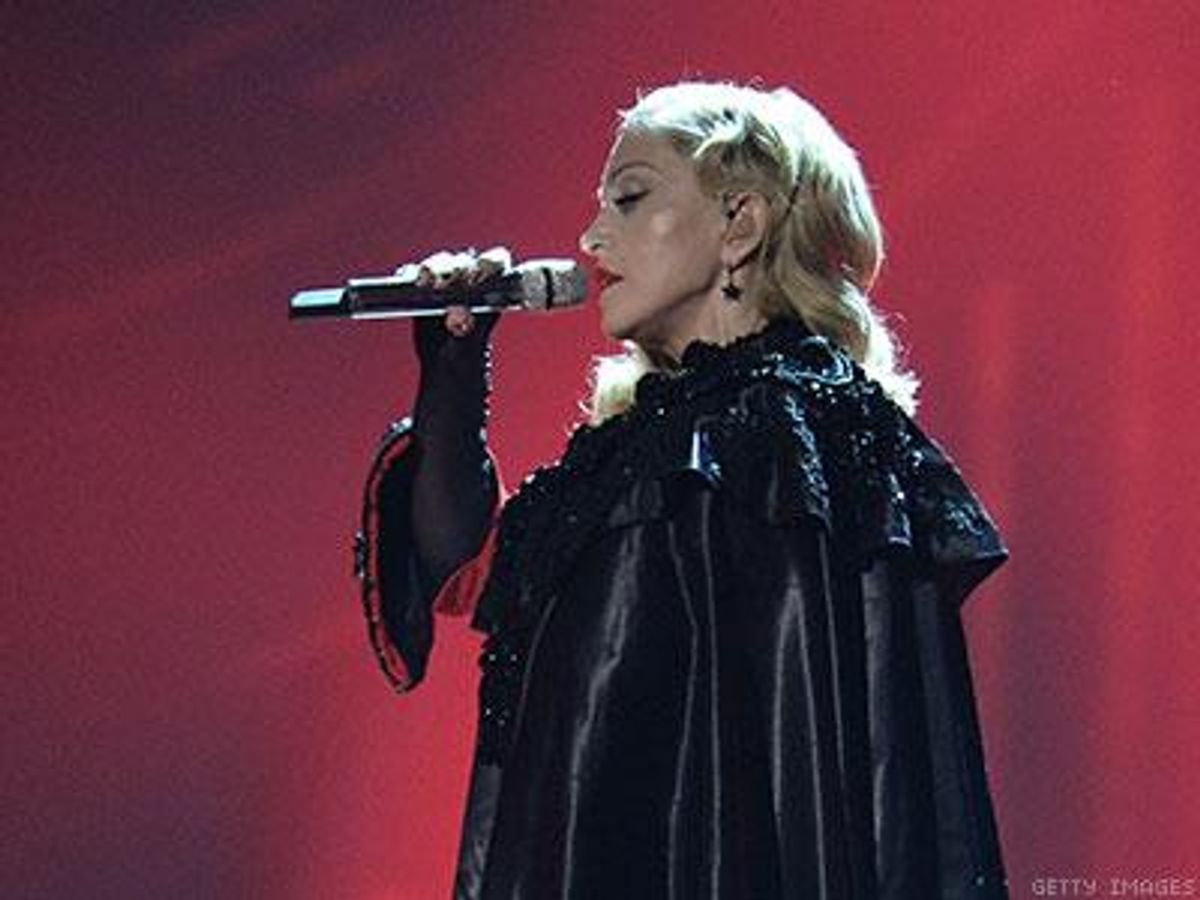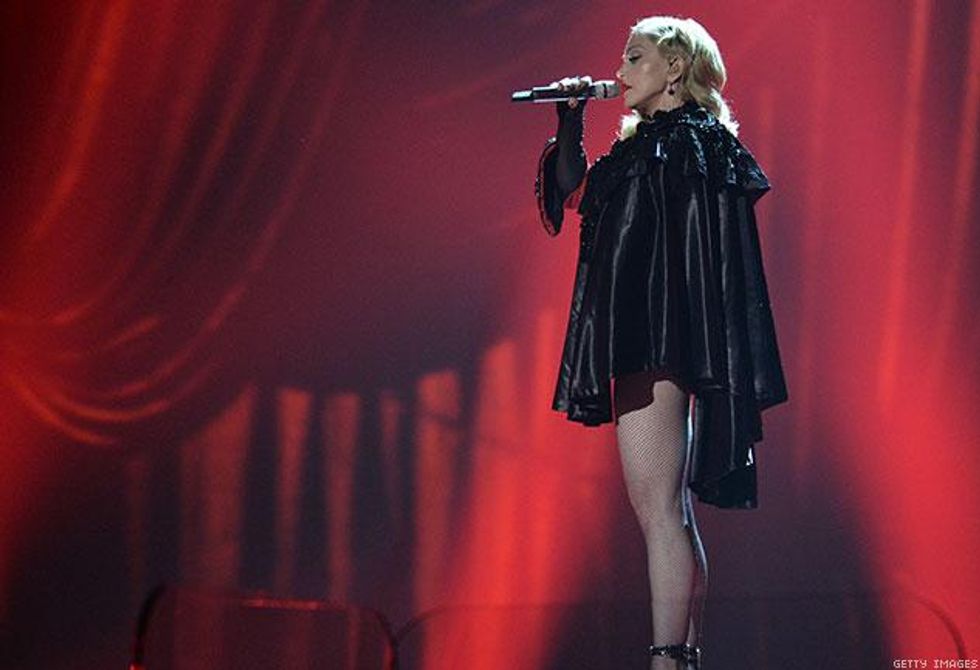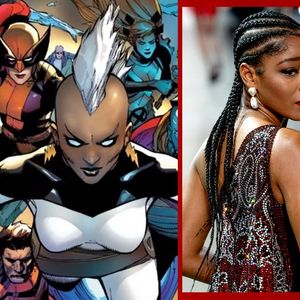
I know I'm not the only gay man to have a secret special connection to Madonna.
My identification with the singer began out of an obsession with her 2005 song "Hung Up" in high school. Between ninth-grade history assignments on the World Wars and my class book report on Lord of the Flies, I secretly looped "Hung Up" on my Discman most nights as I studied.
Being a 15-year-old closet case in an all-boys high school meant that I was only allowed a nightly dose of queer transcendence with the thrusting beats in Madonna's Confessions album. It was an addictive rush and a brief respite from schoolyard bullying and homophobic bullshit.
Fast-forward 10 years and Madonna's 13th studio album, Rebel Heart, is due for release next month, as her return to the center stage begins. Madonna is now all about something new: With a recent performance at the Grammys and a new identity as a Spanish matador, new photo albums on her Instagram account (what ever happened to coffee table books? Sex, anyone?), and a new sound via her Rebel Heart record to no doubt recruit more fans to her dedicated army of followers.
But after her Grammys performance, Madonna became the butt of jokes across the Internet, in news reports, and in magazine fashion op-ed pieces. The "Living for Love" performance, which saw the singer don a matador outfit and tame a band of wild and ferocious "bulls" as she sang about needing more erotic satisfaction, was not received with the warmest welcome.
If we flash back to the '80s, '90s, and 2000s, Madonna was regarded as a transgressive and chameleon-like icon of music and pop stardom. She was someone to be reckoned with. Madonna would invent and reappropriate trends, styles, and sounds in an exciting and transformative way, earning herself the title of "The Queen of Reinvention." However, the Madonna of today is commonly a parody of her former self, seen to be clinging on aesthetic and musical narratives designated for the younger pop star and rejecting the traditional timeline of "aging gracefully."
For me, as a loyal but discerning fan of the legendary songstress, I can straddle both sides of the fence and see why the backlash against the Queen of Pop persists today. Madonna has always thrived on subverting and complicating the gender and sexual narratives for women. She was supremely popular in the 1980s and 1990s because her music, including such choice tracks as "Like a Virgin," "Papa Don't Preach," or "Express Yourself," offered us an image of a woman unapologetic and direct in desire for sexual satisfaction.
Madonna told us she wanted sex and she knew how to get it.
As her image solidified and her popularity grew, Madonna continued to push boundaries. In her infamous coffee table book, Sex, she was photographed performing sexually explicit acts with men and women alike. Not only was she exposing her body -- especially in a time when titillating sex and nudity was the key, not necessarily full exposure -- but also playing with the categories of sex and sexuality. Her fluid erotic exchanges with men and women between the covers confused and excited fans and foes alike, galvanizing her transformative and transcendental potential to mind-fuck with America and its values on sex.
But as is often the case with icons of music, people say, what's she done recently that's good? It's all well and good to talk about the "old Madonna" but what about the Madonna of today?
For me, her 2012 album, MDNA, was Madonna's return to top form. In the three music video she released from the record, Madonna played with three modern and popular aesthetic types -- Technicolor or "airbrushing" culture, black-and-white, and Instagram filters -- and challenged three identities she has been labeled with as a woman and star: mother, gay icon, and media spectacle.
In "Give Me All Your Luvin'," she embraced the iconicity of Marilyn Monroe and maternity to demonstrate her ability to move between these identities and not only retain an enduring sex appeal, but play cheekily in all these roles. She shows how her sexuality and her femininity are performances, just as the image of Marilyn Monroe is as manufactured as Madonna's own.
Then in "Girl Gone Wild," Madonna plays the singular female with a band of (presumably gay) male dancers worshipping her prized body. This may be a convoluted cultural studies analysis but to me the video demonstrates Madonna's enduring appeal to the gay community and many queer fans desperate to experience, touch, and "wrangle" (as takes place in the video) the iconic singer and savor the sublimity of "the Madonna."
For years, Madonna has exploited her name, her femininity, and her womanhood to underscore culture's socio-political construction of all three. By continuing to release music -- whether it's good or bad, that's up for the New York music press to decide -- she is actively rejecting the narratives around woman and aging. Madonna is saying, I'm still here and I still have aesthetic, musical, and cultural challenges and concepts to share with the world. If you don't like me, fuck off.
Madonna remains an easy target to mock and joke about. Many continue to mock her age (56), her histrionics on Instagram (yes, she smashed an iPad and called it an "iPod"), and her seemingly grueling fitness routines, which are often spread across the scandal sheets. But because she is the best-selling female artist of all time and has had a lifetime of achievements that are undoubtedly never going to be replicated, her status as an icon is unquestionable.
Although the music for each forthcoming record may have a sound that some fans (or foes) don't like, the very act of releasing another album is an exciting and important prospect in itself. She is rejecting the expectations of female pop stars of a certain age and saying that since I'm Madonna I can continue to break the rule.
As for me, during my time as the young confused queer, Madonna offered the excitement of knowing that I too can gain self-sufficiency, independence, and knowledge. I too could mock and subvert the cultural and social stereotypes pushed onto me as a gay male.
Ironically, one of those stereotypes eventually become that I should like Madonna's music. And still today, I proudly do.
NATHAN SMITH is a graduate student at the University of Melbourne, Australia, specializing in queer and cultural studies. His work has been published in The Advocate, Salon, and Out. He tweets @nathansmithr.


















































































